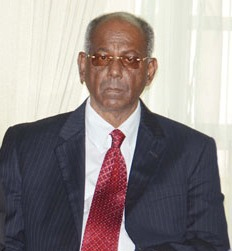Writing in his column in the PPP-aligned, the Weekend Mirror, Ramkarran noted that much speculation surrounds the Budget and the outcome of Government-Opposition engagement before its preparation and after the debate in the National Assembly. Some commentators speculate that there is unlikely to be agreement, particularly after the recent outcome of consideration by the National Assembly of Supplementary Estimates. If they are right the Government will fall and new elections will have to be held, he noted.

However, he pointed out that notwithstanding the Opposition’s positions on the Supplementary Estimates, statements by sections of the Opposition suggest that there could be enough good sense to lead to agreement.
The opposition has been pushing for a say in the crafting of the 2012 Budget but on Saturday APNU’s Shadow Finance Minister Carl Greenidge said that after almost a month, the party is yet to receive a response from Minister of Finance Dr. Ashni Singh as to when the next meeting on the 2012 budget between the government and the opposition will be held. Greenidge told Stabroek News that he is afraid that the parties would not be able to discuss anything of substance given the short time left. The budget must be presented to the House no later than March 30, 2012 and must be passed no later than April 29, 2012.
When contacted yesterday, Presidential Advisor Gail Teixeira said that she was not involved in the discussions of the Economics Services cabinet sub-committee and could not say what was happening.
In his column, Ramkarran said that the Minister of Finance is no doubt in the final stages of deciding the focus, measures and estimates which will be presented to the National Assembly. He is well aware from public statements from the Opposition during the elections campaign and after, about their concerns and the matters they would like to see addressed, he wrote. “It is to be expected that, having charge of the preparation of the budget, the Minister will take into account these issues and seek to address them in the budget,” he said adding that it is in the interests of both the Government and the Opposition to ensure that there is agreement on the Budget and that intransigence is left outside the door when the discussion starts. A spirit of compromise is essential if there is going to be agreement, he wrote.
“The Government ought not to be disturbed by a budget that emerges which is determined by Opposition votes in the National Assembly and is at variance with its own proposals. If the Opposition claims that it has the answers, presents those answers in a budget determined by its majority, it is the Opposition, not the Government, that will have to answer to the electorate if the budget fails to deliver,” Ramkarran wrote.
“If the Minister’s proposals do not meet with the approval of the Opposition, compromises are achievable. It is what the electorate voted for and the political parties are mandated to seek. They will ignore the electorate’s message at their peril,” he said.
According to Ramkarran, the effect of the Opposition’s proposals will be to reduce Government’s revenue while increasing expenditure. “The Opposition will therefore have to present suggestions as to what new taxes to impose and what development programmes to cut. New taxes and savings alone will not be sufficient to finance the Opposition’s demands. Among the big ticket items from which cuts can be made, apart from direct development and infrastructure works, are health, education, housing, water and infrastructure,” he said.
He said that there is no reason for the Government to fall if there is no agreement. “On consideration of the estimates the Opposition will have the opportunity of voting against provisions it does not agree with and support those that it does. It can vote to reduce estimates for particular programmes, as outlined above, and increase those for higher salaries and pensions, and propose motions to reduce VAT and an increase the income tax threshold. The public will then be in a position to judge. It will not have the power to bring money bills by private members to debate without cabinet approval, but the sanctions which can be imposed on the Government by negative votes on aspects of the estimates can be a powerful encouragement to compromise,” he said.
“This is in the interest of all the parties and of Guyana. Each needs to show that it has made achievements and that it deserves a larger share of the vote at the next elections. All need to come out of the budget discussions and debate with something positive, or at least something that they can use to gain or regain ground. And all need to make the budget work for the people of Guyana,” Ramkarran wrote.
He noted that no political party can be certain of the outcome of new elections having regard to the razor thin outcome in November. “After the financially exhausting elections in November, no political party can conceivably relish the prospect of new elections so soon. With these powerful incentives, agreement on the budget is possible and necessary,” he said.




